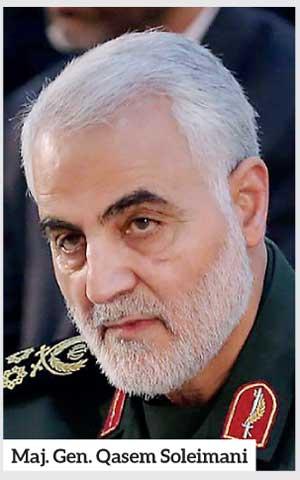Reply To:
Name - Reply Comment
 n Thursday, January 3, as the world was still welcoming the New year, US President Trump gave his own New year’s gift to the world - ordering the assassination of Major General Qasem Soleimani, leader of Iran’s ‘Revolutionary Guards’.
n Thursday, January 3, as the world was still welcoming the New year, US President Trump gave his own New year’s gift to the world - ordering the assassination of Major General Qasem Soleimani, leader of Iran’s ‘Revolutionary Guards’.
The Trump administration’s assassination of Gen. Soleimani could turn out to be one of its biggest blunders. The killing could lead to an escalation of attacks by Iranian proxies across the Middle East. The act also contradicts Trump’s stated aim of pulling the US out of its endless conflicts in the middle east and around the world. The act is also likely to bring pressure on the Iraqi regime to call for the removal of US troops from its country. In other words, extending Iran’s clout
in Iraq by default.
Gen. Soleimani was not killed on the battlefield in a hail of gunfire, but was eliminated in a US drone strike, as he was travelling in a car from Baghdad International Airport. Also killed in that fateful drone attack was Abu Mahdi al-Muhandis, Deputy Commander of Iran-backed militias - the Popular Mobilisation Forces (PMF). Soleimani himself was also the Commander of Iran’s Quds Force, a division responsible for extraterritorial military and clandestine operations
The Pentagon said the attack came “at the direction of the President”, citing the role of Soleimani’s Quds Force in the deaths of hundreds of American and coalition service members and the wounding of thousands more in Iraq and Afghanistan. The statement described the attack as “decisive defensive action to protect US personnel abroad.” The leader of the Revolutionary Guard’s Quds force was also known to be the second most powerful figure in Iran - a revered figure in his country, who made a name for himself during the Iran-Iraq
conflict in the 1980s.
London’s ‘Guardian’ described his assassination as an act of war. It was in effect Trump’s new year gift to an already unstable world from unilaterally tearing up international agreements with Iran to trade war with China, to threats of nuking North Korea - stumbling from one crisis to another, on ‘gut feelings’ of an unstable octogenarian, rather than well thought out plans of action, after weighing the pros and cons of a particular action.
However, rogue attacks on unsuspecting populations, is not a new phenomena in American politics. President Clinton, who was facing impeachment charges over his philandering with White House intern Ms. Lewinsky, just before Congress voted on impeaching him, ordered a cruise missile strike on a Sudan factory claiming it was producing nerve gas for AL-Qaeda. It turned out, the factory was in fact a pharmaceutical plant that employed thousands of Sudanese. Werner Daum, a former German ambassador to Sudan, estimated that “several tens of thousands” of Sudanese civilians died as a result of a shortage of medicine caused by that US military strike. Like Clinton, President Trump is today facing an impeachment trial in the Senate. The parallels are not hard to see, nor the lengths American Presidents would go in efforts to distract attention from their domestic woes.
To the US, Asian and African lives do not matter. US Presidents believe public support for them in America increases during periods of international crisis or war and non-white people are pawns on a chess board to be sacrificed for the altar of their personal whims and fancies. The best or worst example of this callous behaviour, was the nuclear bombing of Japan during the closing stages of World War II, at a time when that country was on the brink of surrender.
Gen. Dwight Eisenhower said in 1963, “ the Japanese were ready to surrender and it wasn’t necessary to hit them with that awful thing.” That wasn’t hindsight. Eisenhower made the same argument in 1945. But would the cold-blooded killing, which the Pentagon described as a means to reduce the security risk to lives of US citizens world-wide, make the lives of US personnel a safer
place to live in?
Ben Friedman, policy director of think tank Defence Priorities in Washington, told CNN that the strike was a “remarkably reckless act, because the forces the US has in the region are not sufficient to deal with the potential fallout.” Friedman describes this killing as an act of war that the Iranians will feel compelled to avenge.